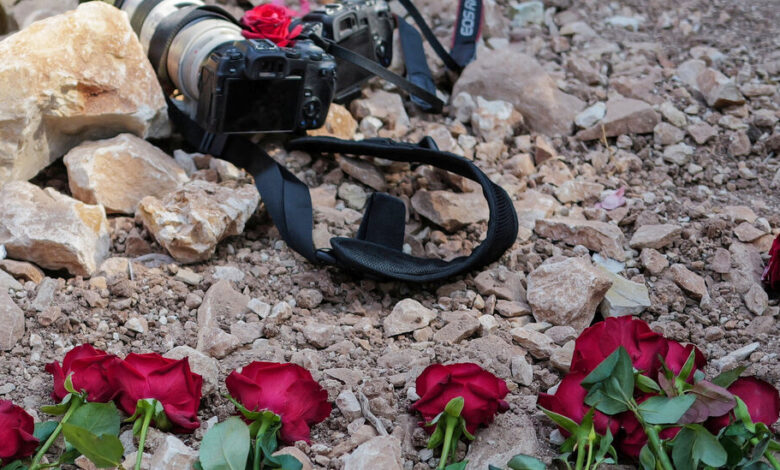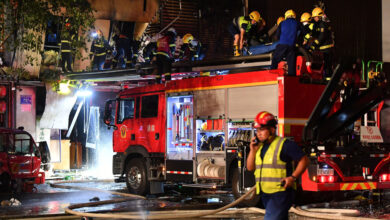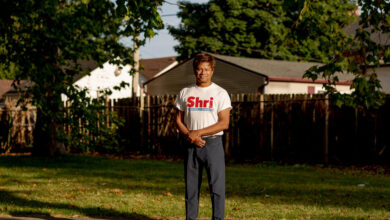Opinion | 60 Journalists Have Been Killed in the Israel-Gaza War. My Friend Was One of Them.

I was sitting in my apartment in Beirut on the evening of Oct. 13 when I read that journalists had been struck by a missile attack in southern Lebanon. My close friend, Issam Abdallah, was working in the area as a cameraman for Reuters to cover the border clashes between Israel and Hezbollah after the war in Gaza began just days earlier. I called him immediately. It was a ritual we had developed over the years: Whether we were on the front lines in Ukraine or Syria, each of us knew to expect a call from the other anytime a disaster struck.
Issam didn’t answer. I couldn’t remember the last time he let one of my calls go to voice mail. Within minutes, cellphone footage of the attack appeared online. In one video, a journalist for Agence France-Presse lies in a pool of blood, screaming that she can’t feel her legs. I listened over and over, desperately trying to find Issam’s voice in the chaos.
Then my doorbell rang. Two of my friends broke the news that Issam had been killed. They shared more footage of the grisly aftermath of the attack. A wave of nausea washed over me as I watched rescue workers wrap Issam and his severed leg in a white sheet, his body charred, barely recognizable.
The next day, I traveled to Khiam, his hometown in southern Lebanon, with hundreds of other mourners, to attend his funeral. Issam was buried in the shade of the ancient olive and pomegranate trees he loved. His family decorated his grave with flowers and his broken cameras and lenses that were destroyed in the strike.
The last time I had been there with Issam, we drank Arabic coffee on the rooftop and flipped over our cups when we were done, pretending to read each other’s fortunes in the residue. He joked that I would become the first female Arab dictator. I said that he’d be the first journalist I’d imprison. We shared our dreams: I wanted to learn jujitsu, read the classics and retire on the Mediterranean. He wanted to take more road trips on his motorbike, adopt more cats and make independent films.
As a journalist, I’m used to reporting the nightmares others live through. I’ve seen mass graves filled with women and children. I’ve walked through entire cities reduced to rubble. I’ve heard the screams of people who have lost everything and everyone they loved in an instant. I used to think that the enormity of the horrors I’ve seen others endure would allow me to bear my own with some perspective when it was my turn.
But it hasn’t. To live through a nightmare and to witness others living through theirs are two very different things. There are limits to the human capacity to feel others’ pain.
Issam was just one of over 60 journalists and media workers who have been killed, mostly from Israeli airstrikes, since the Israel-Gaza war began last month. The Committee to Protect Journalists says it has been the deadliest conflict for media workers since it started keeping records more than three decades ago.
On the day Issam was killed, Gilad Erdan, Israel’s ambassador to the U.N., said that his country never targets journalists, though he conceded that “in a state of war, things might happen.” But a preliminary independent investigation by Reporters Without Borders concluded that Issam and the journalists with him were “explicitly targeted” in the attack, which came from the direction of Israel. This was consistent with eyewitness accounts from other journalists injured in the attack, who were, like Issam, wearing protective gear clearly marking them as press and were miles away from active combat.
In the past seven weeks, Israel has come under increasing scrutiny from human rights and media freedom groups for its suspected targeting of journalists. It’s a concern that has been raised before. In 2019, a U.N. commission report found “reasonable grounds” that during the “Great March of Return” protests in 2018, Israeli forces shot at journalists “knowing they were clearly recognizable as such.” Earlier this year, the Committee to Protect Journalists said journalists being killed in the line of fire by the Israel Defense Forces was part of a “deadly, decades-long pattern” for which no one has been held to account in over 22 years.
In April 2021, I went to Sheikh Jarrah, a neighborhood in East Jerusalem, with my VICE News crew to report on Palestinian families being forcibly evicted from their homes to make way for Israeli settlers. The story garnered millions of views on YouTube, and with it, the ire of the Israeli government.
A year later, when we returned to Israel to cover the protests at Al-Aqsa mosque in Jerusalem, I was denied entry at the airport for “security reasons.” Despite my journalistic credentials, the Israeli government had evidently deemed my Palestinian heritage a security threat. I was forced to work remotely, while my colleagues reported from the occupied West Bank.
An Israeli colonel my crew filmed with made it clear that he didn’t like our coverage. As he drove them in his car, our cinematographer captured the moment on camera when he said to the IDF press officer in Hebrew: “We should show them some action. With all the shooting, maybe they’ll be hit by a bullet.”
About two weeks later, Shireen Abu Akleh, a Palestinian American Al Jazeera correspondent, was shot in the head while reporting in the same location the colonel had “joked” about. Like Issam, Shireen was far from any actual fighting, wearing a helmet and the unmistakable blue vest marked “PRESS” in giant white letters.
The Israeli Army initially denied responsibility for Shireen’s death. But under mounting pressure and evidence from media and human rights organizations, it finally acknowledged that there was a “high possibility” an Israeli soldier had killed her. But Israel refused to charge the soldiers, reinforcing what the U.N. High Commissioner for human rights described as the Israeli Army’s “culture of impunity.”
I met Shireen in 2014 when I was assigned to produce her coverage of the annual U.N. General Assembly meeting. I was a budding journalist, and nervous to work with a legend like her, but was quickly disarmed by her humility. Before she left, she gave me a silver ring with a red embroidered design handmade in Jerusalem. Since I had never been there, she wanted me to have a piece of Palestine I could carry with me.
After Shireen’s killing, I shared with Issam a viral tweet I had posted. He responded with a brief but exuberant audio message: “ya Lama, ya fakhr al-Arab!” (“Lama, you’re the pride of our people!”)
In the unspoken balance of sarcasm and sincerity that develops between good friends, I knew it was both his way of saying, “What do you want, a trophy?” and “Keep it up. This is the work we must all be doing.”
When I returned to my apartment the night after Issam’s funeral, I realized I was locked out. I instinctively reached for my phone to call him. I forgot my keys so often that I had given him a spare set. Looking at my phone, it took me a moment to notice what I was doing.
As I waited for the locksmith, I scrolled through our texts and found that audio message. I played it over and over, living within those four seconds when he was still alive and talking to me.
I doubt there will ever be justice for Issam. But I know that for him, justice wasn’t something anyone could give or take away. It was something he felt a personal duty to bring into the world every single day through his work.
As more and more journalists continue to be killed in this war, mostly in Gaza, I hope that their deaths will not be for nothing, that people will demand their protection as loudly as possible and will continue to remember them. It’s something Issam himself did, in his final Instagram post dedicated to Shireen.
I know the pain of losing my friend is nothing compared with the nightmare people in Gaza are living every day. Entire families have no remaining survivors, while those who do are left to gather the remaining shreds of their loved ones in plastic bags. We are familiar with these scenes only because of the courage of the journalists among them. Every morning, I check their social media accounts to see who survived the night.




